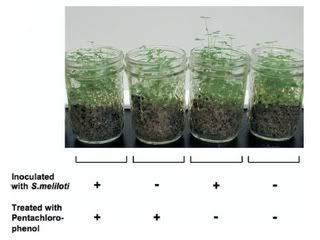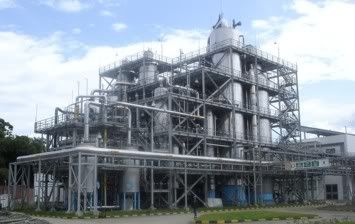Pesticides block nature's pathway to produce nitrogen for crops
 Many farmers applying pesticides to boost crop yields may instead be contributing to growth problems, scientists report in a new study. According to years of research both in the test tube and, now, with real plants, the team found that artificial chemicals in pesticides – through application or exposure to crops through runoff – disrupt natural nitrogen-fixing communications between crops and soil bacteria. The disruption results in lower yields or significantly delayed growth.
Many farmers applying pesticides to boost crop yields may instead be contributing to growth problems, scientists report in a new study. According to years of research both in the test tube and, now, with real plants, the team found that artificial chemicals in pesticides – through application or exposure to crops through runoff – disrupt natural nitrogen-fixing communications between crops and soil bacteria. The disruption results in lower yields or significantly delayed growth.The research is important in light of the long-term sustainability of world agriculture, which will not only feed rapidly growing populations but also produce fuels that have to replace declining oil resources. If food and fuel production can rely less on pesticides, this is obviously a major environmental benefit.
In their open access paper appearing online this week ahead of the regular publication by the Proceedings of the National Academy of Sciences (PNAS), the five-member team reports that agrichemicals bind to and block connections to specific receptors (NodD) inside rhizobia bacteria living in root nodules in the soil. Rotation legume crops such as alfalfa and soybeans require such interaction to naturally replace nitrogen levels that, in turn, benefit primary market crops like corn grown after legume rotations.
"Agrichemicals are blocking the host plant's phytochemical recruitment signal. In essence, the agrichemicals are cutting the lines of communication between the host plant and symbiotic bacteria. This is the mechanism by which these chemicals reduce symbiosis and nitrogen fixation." - Jennifer E. Fox, lead author, postdoctoral researcher at the Center for Ecology and Evolutionary Biology at the University of Oregon.Legume plants secrete chemical signals that recruit the friendly bacteria, which work with the plants to convert atmospheric nitrogen into ammonia that, then, is used as fertilizer by the plants:
 bioenergy :: biofuels :: energy :: agriculture :: energy crops :: nitrogen fixation :: pesticides :: legumes :: sustainability ::
bioenergy :: biofuels :: energy :: agriculture :: energy crops :: nitrogen fixation :: pesticides :: legumes :: sustainability :: Fox began the project as a doctoral student with John A. McLachlan, director of the Center for Bioenvironmental Research at Tulane University. She is working at the University of Oregon as a National Institutes of Health and National Research Service Award postdoctoral fellow under Joe Thornton, a professor of biology who focuses on phylogenomics and nuclear receptor genes.
Fox and colleagues began detailing their findings in the journal Nature (2001) and Environmental Health Perspectives (2004), testing more than 50 chemicals, including pentachlorophenol (PCP), in in-vitro assays. The paper in PNAS reports their in-vivo findings using real plants and bacteria.
None of the chemicals used in the research, including PCP, proved to be toxic to either the plants or bacteria, Fox says, "but PCP was unique in that it inhibited both seed germination and nitrogen fixation." More than 20 commonly used agricultural chemicals shared the same mechanism of action as PCP, but with varying amounts of signal disruption.
Fox, McLachlan and colleagues, in their PNAS paper, pointed to two published studies from 2000 that had found significant declines in both crop yield per unit of synthetic nitrogen fertilizer added and also a significant decline in overall symbiotic nitrogen fixation (image, click to enlarge).
The most common explanation for the observations is an overuse of agrichemicals applied to legume crops. That practice sets up "a vicious cycle," Fox said, because it reduces a legume crop's natural need for nitrogen fixation but leaves a shortage of natural nitrogen in the soil for the next year's crop to utilize. Thus, she said, there is the need for yet more fertilizer.
Other reasons, Fox said, have been poor soil quality due to overuse, which strips nutrients such as nitrogen and phosphorous from the soil, and to tillage, which interrupts root structures and disturbs the nitrogen-fixing bacteria when soil is turned.
"Our research provides another explanation for declining crop yields," Fox said. "We showed that by applying pesticides that interfere with symbiotic signaling, the overall amount of symbiotic nitrogen fixation is reduced. If this natural fertilizer source is not replaced by increased application of synthetic nitrogen fertilizer, then crop yields are reduced and/or more growing time is needed for these crops to reach the yields obtained by untreated crops. We feel that this is a previously unforeseen factor contributing to declining crop yields."
The researchers say that field-wide experiments now are needed, in addition to tests to determine the exact elements of pesticides that inhibit natural plant-bacteria interaction.
Image: Treatment groups pictured are (from left to right) alfalfa inoculated with S. melioti (bacteria) and treated with pentachlorophenol (pesticide), alfalfa that were not inoculated with S. melioti but were treated with pentachlorophenol, alfalfa inoculated with S. melioti and not treated with any chemicals,and alfalfa that were not inoculated with S. melioti and not treated with any chemicals. Pentachlorophenol treatment significantly reduced plant yield, both when plants were inoculated with S. melioti or left uninoculated.
More information:
Jennifer E. Fox, Jay Gulledge, Erika Engelhaupt, Matthew E. Burow, and John A. McLachlan, "Pesticides reduce symbiotic efficiency of nitrogen-fixing rhizobia and host plants", Proceedings of the National Academy of Sciences, June 4, 2007, DOI: 10.1073/pnas.0611710104
Article continues
 --------------
--------------
 According to the Barbados Agricultural Management Company (BAMC), the Caribbean island state has a large enough potential to meet both its domestic ethanol needs (E10) and to export to international markets. BAMC is working with state actors to develop an entirely green biofuel production process based on bagasse and biomass.
According to the Barbados Agricultural Management Company (BAMC), the Caribbean island state has a large enough potential to meet both its domestic ethanol needs (E10) and to export to international markets. BAMC is working with state actors to develop an entirely green biofuel production process based on bagasse and biomass.

 Praj Industries Ltd, one of India's leading engineering, technology and equipment providers for alcohol and fuel ethanol plants,
Praj Industries Ltd, one of India's leading engineering, technology and equipment providers for alcohol and fuel ethanol plants,  Investment tycoon George Soros said Tuesday at the first
Investment tycoon George Soros said Tuesday at the first  A few years ago, energy experts and OPEC members alike would have laughed away the prospect for biofuels to replace oil. Today, they are becoming increasingly worried about their position as investments in the renewable and clean fuels continue on an unprecedented, global scale. In two different interviews ahead of the G8 summit, OPEC secretary-general Abdalla El-Badri contradicts himself: in the first, he says biofuels threaten oil investments and may cause petroleum prices to go "through the roof", whereas in the other, he says the cartel does not feel threatened by climate change measures aimed at reducing carbon dioxide emissions, of which biofuels are an important part.
A few years ago, energy experts and OPEC members alike would have laughed away the prospect for biofuels to replace oil. Today, they are becoming increasingly worried about their position as investments in the renewable and clean fuels continue on an unprecedented, global scale. In two different interviews ahead of the G8 summit, OPEC secretary-general Abdalla El-Badri contradicts himself: in the first, he says biofuels threaten oil investments and may cause petroleum prices to go "through the roof", whereas in the other, he says the cartel does not feel threatened by climate change measures aimed at reducing carbon dioxide emissions, of which biofuels are an important part.






Wednesday, June 06, 2007
Dirty snow may warm Arctic as much as greenhouse gases - cleaner fuels needed
Snow becomes dirty when soot from fossil fuel burning and forest fires enters the atmosphere and falls to the ground. Soot-infused snow is darker than natural snow. Dark surfaces absorb sunlight and cause warming, while bright surfaces reflect heat back into space and cause cooling, a process known as the albedo effect. Burning cleaner fuels would be a ready solution to brighten snow and thus lower temperatures, the scientists say.
Because of their emission profiles, biofuels may contribute to solving part of the problem:
- Both first-generation biodiesel and ultra-clean synthetic biofuels show dramatic reductions in particulate matter and soot emissions compared to fossil fuels.
- Likewise, the co-combustion of biomass with coal in power plants shifts particle size distribution from fine particles to coarse particles, which can be captured by dust collection systems, thus preventing soot and particulate matter emissions.
- Moreover, around 2 billion people in the developing world rely on primitive biomass for energy (basically burning wood or dung on open fires). Introducing modern, clean biofuels amongst this vast mass of people would reduce soot and particulate matter emissions drastically.
- Finally, burning of field residues in agriculture releases vast amounts of soot and fine particles. If these resources were used for power generation and to offset fossil fuels, once again the build up dirty snow could be reduced (see an example from Egypt).
On the other hand, if biofuel production were to imply the burning of forests or field based residues in the open air, they may actually worsen the situation.The study, appearing this week in the Journal of Geophysical Research, shows dirty snow has had a significant impact on climate warming since the Industrial Revolution. In the past 200 years, the Earth has warmed about 0.8 degree Celsius. Charlie Zender, associate professor of Earth system science at UCI, graduate student Mark Flanner, and their colleagues calculated that dirty snow caused the Earth’s temperature to rise 0.1 to 0.15 degree, or up to 19 percent of the total warming.
In the past two centuries, the Arctic has warmed about 1.6 degrees. Dirty snow caused 0.5 to 1.5 degrees of warming, or up to 94 percent of the observed change, the scientists determined (map, click to enlarge).
The amount of warming by dirty snow varied from year to year, with higher temperatures in years with many forest fires. Greenhouse gases, which trap outgoing energy, are primarily responsible for the remaining temperature increase and are considered the Earth’s most important overall climate changing mechanism. Other human influences on Arctic climate change are particles in the atmosphere, including soot; clouds; and land use:
Humans create the majority of airborne soot through industry and fuel combustion, while forest and open-field fires account for the rest. Because of human activity, greenhouse gas levels have increased by one-third in the last two centuries.
"A one-third change in concentration is huge, yet the Earth has only warmed about 0.8 degrees because the effect is distributed globally," Zender said. "A small amount of snow impurities in the Arctic have caused a significant temperature response there."
Previous studies have analyzed dirty snow’s effect on climate, but this is the first to take into account realistic emissions from forest fires in the Northern Hemisphere and how warming affects the thickness of the snow pack.
In some polar areas, impurities in the snow have caused enough melting to expose underlying sea ice or soil that is significantly darker than the snow. The darker surfaces absorb sunlight more rapidly than snow, causing additional warming. This cycle causes temperatures in the polar regions to rise as much as 3 degrees Celsius during some seasons, the scientists say.
"Once the snow is gone, the soot that caused the snow to melt continues to have an effect because the ground surface is darker and retains more heat," Zender said.
Dirty snow is prevalent in East Asia, Northern Europe and Northeastern United States.
Zender believes policymakers could use these research results to develop regulations to mitigate global warming. Limiting industrial soot emissions and switching to cleaner-burning fuels would leave snow brighter, he says. New snow falls each year, and if it contained fewer impurities, the ground would brighten and temperatures would cool. Carbon dioxide lives in the atmosphere for a century, so cutting back on emissions can prevent further warming but does not produce immediate cooling.
UCI scientist James Randerson and Philip Rasch, a scientist at the National Center for Atmospheric Research in Boulder, Colo., also worked on the study. The National Science Foundation and NASA funded this research.
Image: Map showing the annual mean temperature change due to dirty snow in degrees Celsius.
More information:
Mark G. Flanner, Charles S. Zender, James T. Randerson, Philip J. Rasch, "Present-day climate forcing and response from black carbon in snow", Journal of Geophysical Research, Vol. 112, D11202, doi:10.1029/2006JD008003, 2007
Article continues
posted by Biopact team at 5:52 PM 0 comments links to this post